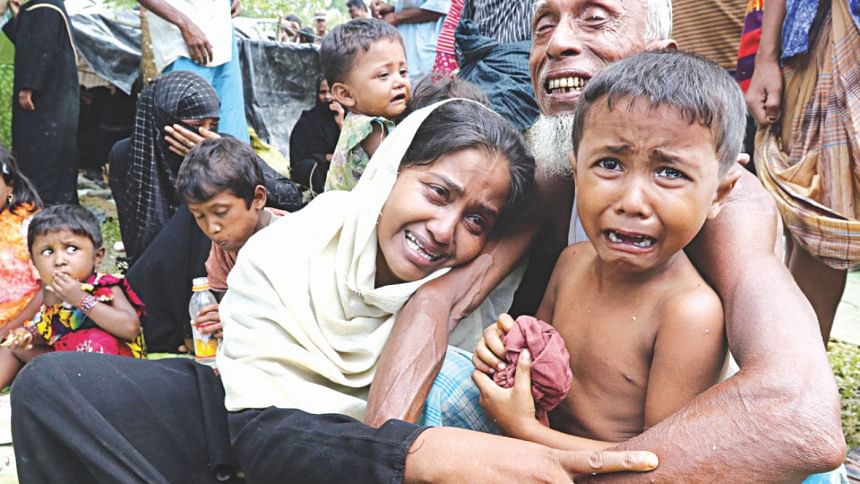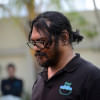In fear, in flight

They are now on this side of the border. On the other side, they have homes, may be burnt down already. It's just several hundred metres away but they are too scared to go back.
They left their villages on Saturday, a day after violence erupted in Rakhine State of Myanmar, according to Dil Mohammed, one of the refugees, who is from Dekibunia of Maungdaw.
"We fled as we heard sounds of firing. We didn't think we were safe there," he said. His fear is not baseless as he is one of the Rohingya Muslims, often called the most persecuted minority in the world.
Previous military responses in Myanmar following insurgent attacks like Friday's were dogged by allegations of rights abuses -- killing Rohingya men, torturing their women and burning houses.
Dil Mohammed, who came with his family members, including wife, sons, daughters-in-law and two grandsons, won't believe that this time there will be any exception.
They are now stranded in Jolpaitoli village of Ghumdum under Bandarban's Naikhyangchhari upazila along with around three hundred other Rohingyas, mostly from three villages of Dekibunia -- Miarpara, Fakirpara and Uttorpara.
The refugees set up temporary tents and toilets, and local representatives and NGOs were providing them with dry food and water.
Bangladesh Border Guard (BGB) tried to send them back yesterday, but they had to return as Myanmar troops allegedly opened fire.
"Most likely they [troops in Myanmar] set fire to our houses as we saw smoke billowing from the other side of the hillocks where our village is located," said Dil Mohammed, pointing towards Myanmar side.
Ruma Yasmin, 17, another refugee from Dekibunia, was at the temporary camp along with her mother, sister and two brothers.
She was seen trying to call somebody over her cell phone. Asked whom she was calling, Ruma said it's her brother Yahiya, left behind in their village.
After several attempts, she could reach him over phone and learnt that he was still safe and military personnel were patrolling the village. Both were using a Bangladeshi phone carrier.
According to locals, over one thousand people came to the Jolpaitoli point from those villages of Myanmar. Now only three hundred of them are at the makeshift camp as others managed to melt into Rohingya people living in different Bangladeshi villages.
The UN refugee agency said more than 3,000 had arrived in the past three days following the fresh outbreak of conflict between Rohingya militants and Myanmar troops in Rakhine State, bordering Bangladesh.
"UNHCR and other UN Agency teams in registered camps estimated that more than 3,000 'newly arrived' individuals were seen in and around the camp," said UNHCR spokesman Joseph Tripura, AFP wrote.
"Many of the new arrivals are women and children including some un-accompanied and/or separated children."
Meanwhile, Bangladesh yesterday lodged a strong protest for terming Myanmar's own insurgents as "Bengali terrorists" and asked the neighbouring country to refrain from using such "unacceptable" words.
The foreign ministry called Aung Myint, chargé d'affaires at Myanmar Embassy in Dhaka yesterday, second time since Saturday.
Bangladesh also proposed a joint operation by the security forces of the two countries against Myanmar's terrorists, militants, extremists or any other anti-state forces on the border.
Manjurul Karim Khan Chowdhury, director general (Southeast Asia wing) at the ministry, called the chargé d'affaires at his office and conveyed these two specific message.
Talking to The Daily Star yesterday, a senior ministry official told The Daily Star that the government made the specific proposal regarding the joint operation to assist Myanmar.
Following its "zero tolerance" policy on violent extremism and terrorism of any form, Bangladesh also assured Myanmar of its continued cooperation in dealing with these challenges.
After the latest flare-up of violence, the Myanmar army in its statements used the state's description for Rohingya militants, mentioning them as "Bengali terrorists".
In one such statement, Min Aung Hlaing, commander-in-chief of the armed forces, said, "The military and police members are fighting back together against extremist Bengali terrorists."
The Rohingyas are denied citizenship and are seen by many in Myanmar as illegal immigrants from Bangladesh, despite claiming roots in the region that go back centuries, with communities marginalised and occasionally subjected to communal violence.
As militants besieged border posts in northern Rakhine State early Friday, the army also said, "In the early morning at 1:00am, the extremist Bengali insurgents started their attack on the police post ... with the man-made bombs and small weapons."
The Arakan Rohingya Salvation Army (ARSA), a group previously known as Harakah al-Yaqin, claimed responsibility for the offensive, and warned of more.
In an exclusive interview with Asia Times, a representative of the group, who identified himself simply as Abdullah, said its August 25 attacks were staged in "self-defence" and would continue until Rohingya rights are restored.
He insisted that the military crackdown had gathered pace following the reinforcement of security forces by an estimated 400 troops of the crack 33rd Light Infantry Division on August 10-11, the newspaper reports.
It had left them "no choice other than to strike back in defence of civilian communities" facing what he described as further killings and abuses by security forces.
INFLUX ON
Unconfirmed sources claim that over a thousand Rohingyas belonging to 261 families entered Bangladesh through Ghumdum, Tombru, Jolpaitoli, Reju Aamtali, Baishpari and Kolabagan points of Naikhyangchhari border just in the last two days.
And a few thousand thronged no man's land trying to cross the border.
"So far we have made a list of 261 families among whom we distributed dry food," said an official working with the World Food Programme, wishing anonymity.
Refugees are also entering through some other points, including Unichiaprang, Lambabil and Ulubunia in Teknaf, Anzuman Para and Rahmaterbil in Ukhia of Cox's Bazar.
Sources also say BGB gathered around five hundred Rohingyas in No 1 Sluice Gate area of Unichiaprang yesterday.
Another 75 along with two brokers have been detained while trying to enter Kutupalong camp for registered refugees on Sunday night.
Besides, BGB has pushed back a total of 475 Rohingya people to Myanmar, said SM Arifur Islam, director of BGB Battalion-2 in Teknaf.
"After providing them with food and water, we have sent back the Rohingyas to their country as they were trying to enter Bangladesh territory illegally."
Bangladesh's foreign ministry had earlier said that thousands of "unarmed Myanmar nationals" had assembled near the border to enter the country.
The ministry summoned the Myanmar's charge d' affairs also on Saturday and expressed "serious concern" over the recent happenings, including the fresh entry of Myanmar nationals into Bangladesh.
Meanwhile, BGB Director General of BGB Maj Gen Abul Hossain said combined initiatives were taken to prevent Rohingyas from entering Bangladesh.
"We have deployed forces at critical points through which people are able to enter the country's territory... But we would not able to deploy our personnel at all the border points," he told reporters following a programme at the BGB headquarters in Dhaka yesterday.
He said BGB members have been kind to the refugees.
About the ongoing crisis in Myanmar, the BGB boss said, "We have seen flickering flames on the other side [of the border], heard sounds of firing..."
Asked about holding talks with Myanmar's Border Guard Police (BGP), he said they discussed the situation with the BGP on Sunday.
Rohingyas have been fleeing Myanmar to Bangladesh since early 1990s and around 4,00,000 of them now live in this country.
Around 33,000 registered refugees live in two camps of Cox's Bazar and the rest in different areas of Cox's Bazar and Chittagong.
11 MORE ADMITTED TO CMCH
Eleven Rohingyas -- nine bullet-hit and two with burn injuries -- were admitted to Chittagong Medical College Hospital (CMCH) since early hours till afternoon yesterday.
Myanmar troops shot them while they were fleeing towards Bangladesh border, said police, quoting the injured.
With the eleven, the total number of injured Rohingyas admitted to CMCH stands at 17. Mohammad Musa, 23, who suffered bullet injuries while fleeing alleged police action, died at the hospital on Saturday morning.

 For all latest news, follow The Daily Star's Google News channel.
For all latest news, follow The Daily Star's Google News channel. 



Comments